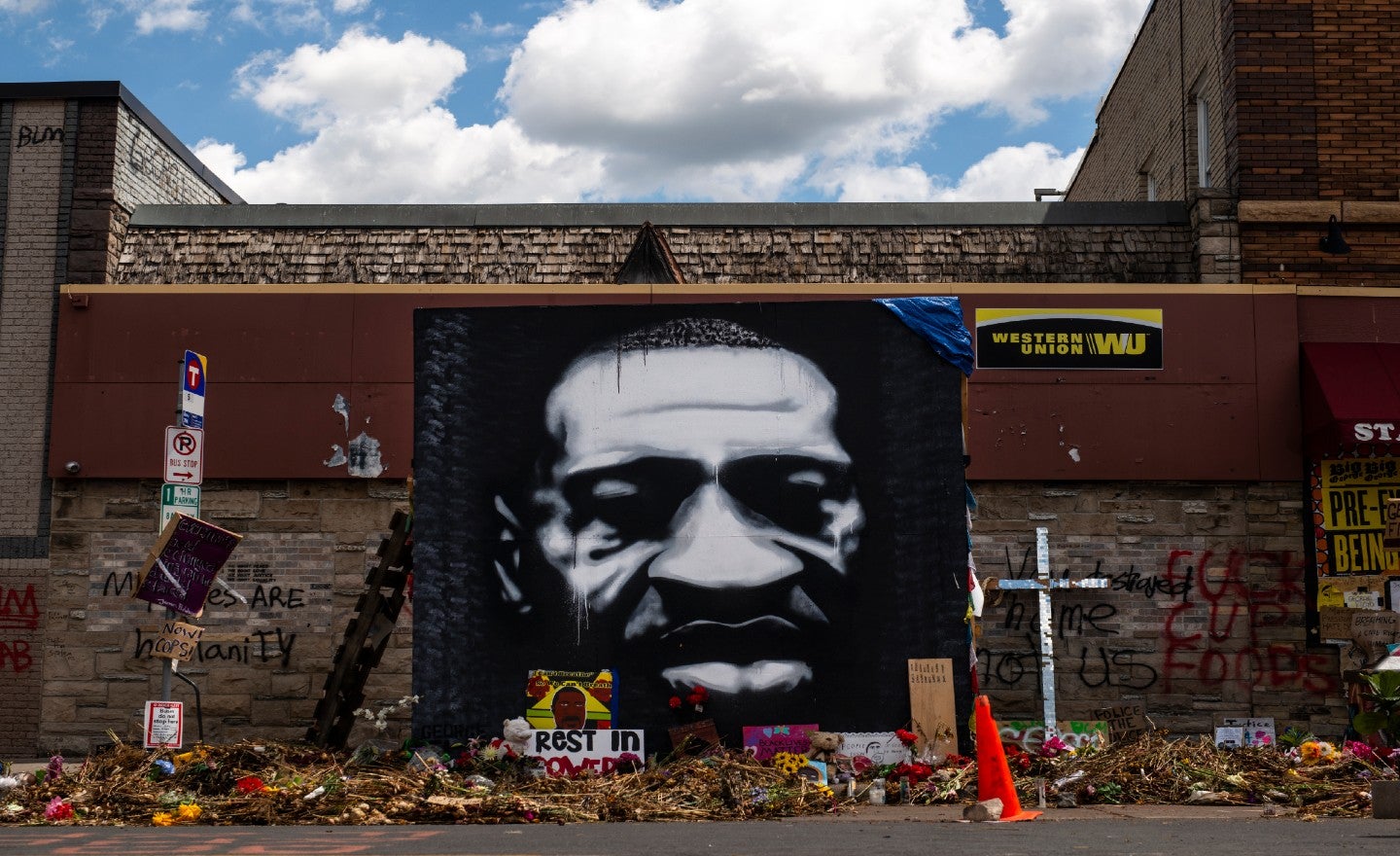The House late Wednesday night gave the green light to the George Floyd Justice in Policing Act in a 220-212 vote.
The vote was initially scheduled to happen Thursday but was moved up due to a potential threat to the Capitol related to the QAnon conspiracy theory.
Rep. Ilhan Omar Ilhan OmarOmar introduces bill to sanction Saudi crown prince over Khashoggi killing Progressives push White House to overturn wage ruling Mehdi Hasan gets MSNBC Sunday prime-time show MORE (D), who represents the Minnesota district where George Floyd was killed by Minneapolis police last May, served as Speaker pro tempore during the floor debate over the legislation.
Ilhan OmarOmar introduces bill to sanction Saudi crown prince over Khashoggi killing Progressives push White House to overturn wage ruling Mehdi Hasan gets MSNBC Sunday prime-time show MORE (D), who represents the Minnesota district where George Floyd was killed by Minneapolis police last May, served as Speaker pro tempore during the floor debate over the legislation.
The sweeping police reform bill received no Republican votes. Initially, Rep. Lance Gooden Lance GoodenHouse Republicans ask for briefing on threats keeping National Guard in DC READ: The Republicans who voted to challenge election results Here are the Republicans planning to challenge the Electoral College results MORE (R-Texas) had voted in favor of bill but he later tweeted that he had pressed the wrong button. Two Democrats, Reps. Jared Golden (Maine) and Ron Kind
Lance GoodenHouse Republicans ask for briefing on threats keeping National Guard in DC READ: The Republicans who voted to challenge election results Here are the Republicans planning to challenge the Electoral College results MORE (R-Texas) had voted in favor of bill but he later tweeted that he had pressed the wrong button. Two Democrats, Reps. Jared Golden (Maine) and Ron Kind Ronald (Ron) James KindSix ways to visualize a divided America House Republican campaign arm rolls out target list for midterms Five centrist Democrats oppose Pelosi for Speaker in tight vote MORE (Wis.), voted against the measure.
Ronald (Ron) James KindSix ways to visualize a divided America House Republican campaign arm rolls out target list for midterms Five centrist Democrats oppose Pelosi for Speaker in tight vote MORE (Wis.), voted against the measure.
The bill faces a tough road in the Senate, where GOP lawmakers are already bashing it as overly partisan.
Still, Rep. Joyce Beatty Joyce Birdson BeattyBlack Caucus members lobby Biden to tap Shalanda Young for OMB head Harris holds first meeting in ceremonial office with CBC members On The Money: Senate panels postpone Tanden meetings in negative sign | Biden signs supply chain order after ‘positive’ meeting with lawmakers MORE (D-Ohio), chair of the Congressional Black Caucus, said she and other leaders of the group have had “great conversations” with Sen. Tim Scott
Joyce Birdson BeattyBlack Caucus members lobby Biden to tap Shalanda Young for OMB head Harris holds first meeting in ceremonial office with CBC members On The Money: Senate panels postpone Tanden meetings in negative sign | Biden signs supply chain order after ‘positive’ meeting with lawmakers MORE (D-Ohio), chair of the Congressional Black Caucus, said she and other leaders of the group have had “great conversations” with Sen. Tim Scott Timothy (Tim) Eugene ScottTrump endorses Tim Scott for reelection This week: Senate takes up coronavirus relief after minimum wage setback Lobbying world MORE (R-S.C.) about finding middle ground in hopes of pushing the bill through the 50-50 Senate and to President Biden
Timothy (Tim) Eugene ScottTrump endorses Tim Scott for reelection This week: Senate takes up coronavirus relief after minimum wage setback Lobbying world MORE (R-S.C.) about finding middle ground in hopes of pushing the bill through the 50-50 Senate and to President Biden Joe BidenIntercept bureau chief: minimum wage was not ‘high priority’ for Biden in COVID-19 relief South Carolina Senate adds firing squad as alternative execution method Obama alum Seth Harris to serve as Biden labor adviser: report MORE’s desk. Scott, the only Black Republican senator, has his own police reform proposal, and has been open to elements of the Democrats’ version.
Joe BidenIntercept bureau chief: minimum wage was not ‘high priority’ for Biden in COVID-19 relief South Carolina Senate adds firing squad as alternative execution method Obama alum Seth Harris to serve as Biden labor adviser: report MORE’s desk. Scott, the only Black Republican senator, has his own police reform proposal, and has been open to elements of the Democrats’ version.
“[It’s] different than the last time, where we are in the country,” Beatty said, referring to shifting cultural attitudes surrounding law enforcement. “I think it has given people more feeling of: this could be the right thing to do at the right time.”
Beatty declined to say whether House Democrats are prepared to accept a slimmed-down version of the bill, but also isn’t ruling anything out.
“I’m not at the point yet of taking [anything] out,” she said. “We like the bill as it is.”
Senate Republicans had balked, in particular, at the provision eliminating certain legal protections currently afforded to law enforcers in many states and precincts. Known as qualified immunity, those protections are needed, Republicans argue, to shield law enforcers from rampant litigation.
Rep. Karen Bass Karen Ruth BassSunday shows preview: 2024 hopefuls gather at CPAC; House passes coronavirus relief; vaccine effort continues Black Caucus members lobby Biden to tap Shalanda Young for OMB head George Floyd police reform bill reintroduced in House MORE (D-Calif.), the original sponsor of the bill, said she intends to counter those criticisms by examining localities where similar reforms have already been enacted.
Karen Ruth BassSunday shows preview: 2024 hopefuls gather at CPAC; House passes coronavirus relief; vaccine effort continues Black Caucus members lobby Biden to tap Shalanda Young for OMB head George Floyd police reform bill reintroduced in House MORE (D-Calif.), the original sponsor of the bill, said she intends to counter those criticisms by examining localities where similar reforms have already been enacted.
“The states have taken up all kinds of reforms,” Bass said. “And the sky hasn’t fallen.”
To be sure, the proposal has a better chance of garnering bipartisan support than another big piece of the House Democratic agenda, H.R. 1, a wide-reaching package overhauling the campaign finance system and restoring certain voting rights.
As it currently reads, the police reform bill would overhaul national policing standards on several levels.
Racial profiling at every level of law enforcement would be prohibited; chokeholds, carotid holds and no-knock warrants would be banned at the federal level; qualified immunity for officers would be overhauled and a national police misconduct registry would be created so officers who were fired for such discretions could not be hired by another police department.
Although the bill would not technically mandate the prohibition of certain reforms such as chokeholds at a state and local level, it would tie in the new federal standards as thresholds for police departments to meet if they wanted to continue receiving federal aid.
The legislation was introduced initially to the House last summer after George Floyd, a Black man, was killed by a Minneapolis police officer who knelt on Floyd’s neck for nearly nine minutes.
Floyd’s death, as well as the police killing of Breonna Taylor, sparked a summer dominated by nationwide Black Lives Matter protests demanding substantive police reform and the rooting out of systemic racism.
In addition to Bass’s bill in the House, Scott and Sen. Rand Paul Randal (Rand) Howard PaulSenate confirms Rouse as Biden’s top economist Overnight Health Care: 50 million coronavirus vaccines given | Pfizer news | Biden health nominees Rand Paul criticized for questioning of transgender health nominee MORE (R-Ky.) introduced police reform proposals of their own in the Senate, underscoring the bipartisan nature of the issue.
Randal (Rand) Howard PaulSenate confirms Rouse as Biden’s top economist Overnight Health Care: 50 million coronavirus vaccines given | Pfizer news | Biden health nominees Rand Paul criticized for questioning of transgender health nominee MORE (R-Ky.) introduced police reform proposals of their own in the Senate, underscoring the bipartisan nature of the issue.
Scott’s bill, the JUSTICE Act, covers many of the same areas of concern addressed by the Democrats’ bill such as the banning of chokeholds. Paul’s Justice for Breonna Taylor Act aimed to ban no-knock warrants — the technique which led to Taylor’s death — something the George Floyd Justice in Policing Act would prohibit.
Still, the road to negotiating a bill that would pass the evenly split Senate could be arduous.
Scott in a statement Tuesday signaled he was open to discussing the proposed slashing of qualified immunity for officers, a policy point of contention, but called the House version of the bill “partisan.”
“I hope my friends on the other side of the aisle will come to the table to find common ground where we can make meaningful changes that will bring us closer to the goal of a more just country,” Scott said.
Mike Lillis contributed.
Updated 10:08 p.m.
















